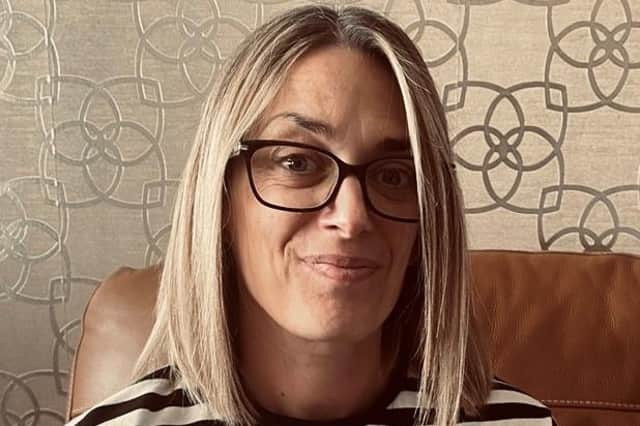Tayside mums tell of impact MS service has had on their lives


MS Society Scotland’s Peer Support service has now been available to everyone living with MS in Scotland, via the charity’s Wellbeing Hub, for six months after starting out as local offering in Tayside in June 2021.
People who access the service are matched with a volunteer, who also has MS, and they meet virtually for an average six sessions. The volunteer shares their own experiences of living with MS to help the participant reach personal goals.
Advertisement
Hide AdAdvertisement
Hide AdAudrey Fleming, 48, a mother-of-one from Glamis, was diagnosed with relapsing remitting MS (RRMS) in 2017. Audrey works as a doctor’s surgery receptionist and says her MS mostly affects her balance – she uses a walking stick – and causes daily pain in her legs, which she describes as “if you think of your legs as elastic bands, and somebody is really stretching the elastic bands, that’s the pain I get”.
Audrey was one of the first people to be matched with a volunteer and she was paired with Tracy Scott.
Speaking about why she made the decision to approach the Peer Support service, Audrey said: “When I was diagnosed, all I saw was my Dad, and he eventually was in a wheelchair, and that’s what I thought MS was; I didn’t realise there were so many different stages. Tracy explained more to me about the differences in MS than my consultant did. She explained that even though she had RRMS as well, everybody is different, it doesn’t affect everybody in the same way.
“The first and last Zoom sessions with Tracy were a bit formal as they were structured towards my goals but in between it was like chatting with a friend, catching up, seeing what was happening and whether there was anything she could help with. I did have a counsellor as well so I thought of Tracy as my ‘go to’ for help and advice about day-to-day things and how to work out different situations, and my counsellor was more the sort of emotional ‘getting things out’ person. So it was good I had both practical and emotional support.
Advertisement
Hide AdAdvertisement
Hide Ad“I’d definitely recommend Peer Support. There are things that Tracy’s mentioned, and situations that she’s dealt with, that I could relate to and I can imagine other people would relate to as well. I’d especially recommend it when someone is first diagnosed because you’ve got everything going around in your head and you’re not sure what to do with this or that and it definitely, definitely did help.”
The Peer Support service was created as part of the My MS My Way Tayside project. The project launched in June 2019 after engagement with the MS community in Tayside revealed a lack of non-clinical provision for people who had been recently diagnosed. MS Society Scotland was the lead partner in My MS My Way Tayside and collaborated with Tayside MS Therapy Centre and NHS Tayside.
From June 2021 until the end of last year, 20 people from Tayside accessed the service. After six months, a decision was taken to make it available to everyone living with MS in Scotland and it is now provided through MS Society Scotland’s Wellbeing Hub. An additional 10 people have accessed the Peer Support service since it moved to the Wellbeing Hub.
The virtual service is free and confidential. Participants are matched with volunteers based on what the participant would like to get from their Peer Support sessions.
Advertisement
Hide AdAdvertisement
Hide AdVolunteer Tracy Scott, 44, from Arbroath works as a digital developer and is a mother of three. She was diagnosed with RRMS in 2015 and has been involved with the Peer Support service since it began in Tayside. She has supported several people and is currently helping more. She says she is fortunate that her symptoms are relatively mild but she does experience numbness in her hands and feet, weakness, and some muscle pain.
Tracy said: “I was actually at a routine appointment with my consultant and she commented on my outlook, and said I was really positive. We were talking about my health and wellbeing and the fact I keep quite active and eat healthily. She felt if I got involved in peer to peer support I would then be able to share my positive experiences. My experiences myself at diagnosis weren’t great so if I can share the more positive side of having a diagnosis like that then that’s what I was there to do.”
Tracy underwent training with MS Society Scotland, covering topics such as data protection, safeguarding, other support services she could signpost people to – both within and outwith the charity – as well as how to encourage and support people to share information about their MS with others.
“I’ve spoken to people about a wide variety of different things like health, wellbeing, pain management, fatigue, relationships,” she said. “I’ve seen an increase in people’s confidence and also seen them having stronger relationships with their partners, family and work, based on the fact they feel more comfortable having conversations about how they’re feeling, about things they can and can’t do.
Advertisement
Hide AdAdvertisement
Hide Ad“As volunteers we are all set up with email addresses, which is great for keeping in contact. Everyone I’ve supported previously has got my details in case they need me but nobody’s been in touch and I’m hoping that’s a good thing.”
Morna Simpkins, Director of MS Society Scotland, said: “I would like to say a huge ‘thank you’ to Tracy and all the other volunteers and also to colleagues who work so hard to enable us to provide all our support services.”